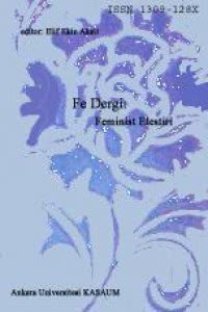Pronatalist Kültürde Anne Olmamak
pronatalizm, pronatalist kültür, annelik, çocuksuzluk, gündelik ve yakın ilişkiler
Being Nonmother in a Pronatalist Culture
___
- Akşit, Elif Ekin. “Geç Osmanlı ve Cumhuriyet Dönemlerinde Nüfus Kontrolü Yaklaşımları,” Toplum ve Bilim, 117 (2010) :179-197.
- Arendell, Terry. “Conceiving and Investigating Motherhood: The Decade’s Scholarship,” Journal of Marriage and Family, 62 (2000): 1192-1207.
- Bartholomaeus, Clare& Riggs, W. Daimen. “Daughters and Mothers: The Reproduction of Pronatalist Discourses Across Generations,” Women’s Studies International Forum, 62 (2017):1-7.
- Benezra, Belin. “The Institutional History of Family Planning in Turkey.” K. Kamp et.al. (eds.) Contemporary Turkey at a Glance (2014): 41-56, DOI 10.1007/978-3-658-04916-4_5.
- Clarke Hurd, Laura; Martin-Matthews, Anne; Matthews, Ralph. “The Continuity and Discontinuity of the Embodied Self in Infertility,” CRSA/RCSA, 43:1 (2006): 95-113.
- Daniluk, C. Judith. “When Biology Isn't Destiny: Implications for the Sexuality of Women Without Children,” Canadian Journal of Counselling, 33:2 (1999): 79-94.
- De Beauvoir, Simone. Kadın İkinci Cins II Evlilik Çağı. (İstanbul: Payel Yayınevi, 2010).
- Donath, Orna. “Choosing motherhood? Agency and Regret Within Reproduction and Mothering Retrospective Accounts,” Women's Studies International Forum, 53 (2015): 200–209.
- Edwards, Natalie. Voicing Voluntary Childlessness Narratives of Non-Mothering in French. (Oxford, Berlin, Bruxelles: Peter Lang, 2016).
- Gillespie, Rosemary. “Voluntary Childlessness in the United Kingdom,” Reproductive Health Matters, 7:13 (1999): 43- 53, DOI: 10.1016/S0968-8080(99)90111-8.
- Gillespie, Rosemary. “When No Means No: Disbelief, Disregard and Deviance as Discourses of Voluntary Childlessness,” Women’s Studies International Forum, 23:2 (2000): 223-234
- Gillespie, Rosemary. “Childfree and Feminine: Understanding the Gender Identity of Voluntary Childless Women,” Gender and Society. 17:1 (2003): 122-136.
- Hays, Sharon. The Cultural Contradictions of Motherhood. (NewHaven&London: Yale University Press, 1996).
- Heitlinger, Alena. “Pronatalism and Women's Equality Policies,” European Journal of Population / Revue Européenne de Démographie,7: 4 (1991): 343-375.
- Hird, J. Myra ve Abshoff, Kimberly. “Women without Children: A Contradiction in Terms?,” Journal of Comparative Family Studies, 31:3 (2000):347-366.
- Jones, K. Rachel; Brayfield, April. “Life’s Greatest Joy? : European Attitudes Toward the Centrality of Children,” Social Forces, 75:4 (1997): 1239-70.
- Kelly, Maura. “Women's Voluntary Childlessness: A Radical Rejection of Motherhood?” Women's Studies Quarterly, 37: 3/4 (2009): 157- 172.
- Letherby, Gayle. Other Than Mother and Mothers as Others: The Experience of Motherhood and Non-Motherhood in Relation to “Infertility” and “Involuntary Childlessness,” Women’s Studies International Forum, 22:3 (1999): 359-372
- Letherby, Gayle. “Childless and Bereft? Stereotypes and Realities in Relation to Voluntary and Involuntary Childlessness and Womanhood,” Sociological Inquiry, 72:1 (2002): 7-20.
- Lovett, L. Laura. “Pronatalism” Encyclopedia of Motherhood ed. Andrea O’Reilly (Thousand Oaks, California: Sage Publication, 2010), 1028-29.
- Meyers Tietjens, Diana. “The Rush to Motherhood: Pronatalist Discourse and Women's Autonomy,” Signs, 26 :3 (2001): 735-773.
- Morell, Carolyn. “Saying No: Women’s Experiences with Reproductive Refusal” Feminism and Psychology, (2010): 313-322.
- O’Reilly, Andrea. (ed.) From Motherhood to Mothering The Legacy of Adrienne Rich’s of Women Born. (Albany: State University of New York Press, 2004).
- Peterson, Helen. “Fifty Shades of Freedom: Voluntary Childlessness as Women’s Ultimate Liberation” Women’s Studies International Forum, 53 (2015): 182-191.
- Park, Kristin. “Stigma Management Among the Voluntary Childless,” Sociological Perspective Volume 45:1 (2002): 21- 45.
- Rich, Adrienne. Of Woman Born Motherhood as Experience and Institution. (New York&London: W.W. Norton&Company, 1986).
- Rich, StephanieTaket, Ann;Graham, Melissa; Shelley, Julia. “‘Unnatural’, ‘Unwomanly’, ‘Uncreditable’ and ; ‘Undervalued’: The Significance of Being a Childless Woman in Australian Society,” Gender Issues 28, (2011): 226–247, DOI 10.1007/s12147-011-9108-1.
- Shapiro, Gilla. “Voluntary Childlessness: A Critical Review of the Literature,” Studies of Maternal, 6:1 (2014): 1-15.
- ISSN: 1309-128X
- Yayın Aralığı: 2
- Başlangıç: 2008
- Yayıncı: Ankara Üniversitesi KASAUM
Toplumsal Cinsiyet ve Mesleki Eğitim: Mesleki Teknik Lise Kız Öğrencileri Üzerine Bir Araştırma
Alev ÖZKAZANÇ, Fevziye SAYILAN, Elif E AKŞİT
Sosyalleştirilmiş Sağlık Hizmetlerinde Ebelerin Sağlık Ocağı İle İlişkisinin Mekânsal İncelemesi
Jane Addams’ın Perspektifinden Kent Yönetimi ve Kadınlar
Dillendiril(e)meyen Kadın Bedeninin Orlando’da Dile Gelişi
Muzaffer Derya Nazlıpınar SUBAŞI
Dindar Kadınların Annelik Algısı: Reçel Blog ve Müslüman Anneler Blogunun Karşılaştırmalı Analizi
Nick Hornby’nin Futbol Ateşi 1992 Romanında Erillik
Homososyal Birliktelik Örneği Olarak Mahalleyi Korumak: Sıfır Bir1 Dizisinde Erkeklik Halleri
